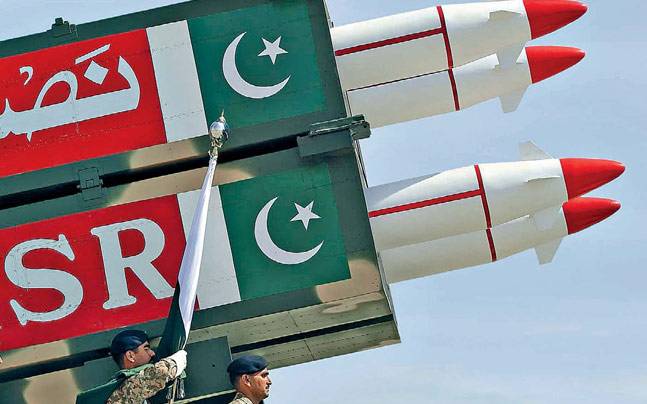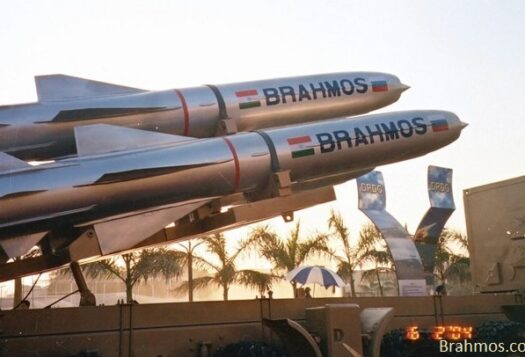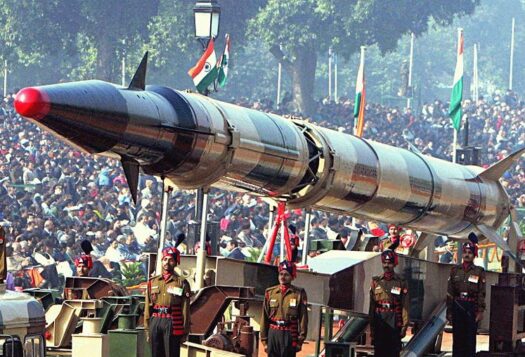
The recent Iranian nuclear deal has been termed a major breakthrough by experts of nuclear nonproliferation issues. The deal is merely an agreed political framework to seek a permanent solution to the issue, but it has reaffirmed the faith of nonproliferation proponents, albeit with caution. The outcome of the deal suggests that a convergence of interests could persuade states to solve any complex issue through dialogue, provided the resolve is there. The most positive aspect of the deal is that the United States and Iran came to an agreement despite the fact that their bilateral relations have been plagued by a huge trust deficit and hostility. The deal would also result in the emergence of a keen interest in promoting the nonproliferation cause, and would encourage P-5 states, led by the United States, to address the issue of WMDs possessed by the states outside the NPT like India, Pakistan, Israel, and North Korea.
Pakistan’s nuclear weapons would be a significant source of attraction due to several unfortunate and hard-to-ignore factors.
These factors include:
- Recent weapons development by Pakistan such as the induction of tactical nuclear weapons (the Nasr Short range missile) and the flight test of the Shaheen-III missile (with a declared range of 2,750 km)
- Pakistan’s policy on the Fissile Material Cutoff Treaty (FMCT)
- A.Q. Khan’s legacy
- Political instability and socioeconomic issues in Pakistan
- The issue of religious extremism and terrorism and the subsequent issue of nuclear security
- Strong military control and the absence of civilian oversight on the nuclear weapons program
- A continuous obsession with India and an inability to take effective action against the Mumbai attacks culprits
- General Kidwai’s indication of the development of a sea-based nuclear deterrent by Pakistan and news about a deal with China to buy submarines
Nuclear experts and U.S. officials who had experience in handling the tactical nuclear weapons issue during the Cold War have expressed deep concerns over the fallout of Pakistan’s strategy of “full spectrum deterrence.” They have raised the issues of command and control, security of these weapons (especially during a crisis), and implications for crisis stability. The Indian response – denying any difference between tactical and strategic nuclear weapons and adhering to a policy of massive retaliation – has further generated concerns over the possibility of nuclear exchange between India and Pakistan. Moreover, many believe that the presence of terrorist groups in Pakistan and Pakistan’s reluctance to take effective action against them could give birth to a crisis between India and Pakistan in the wake of a possible terrorist attack on Indian soil by a Pakistan-based jihadist. Some degree of criticism is to be expected, but the inability of Pakistan to effectively address and respond to these concerns has caused further apprehensions for regional peace and security.
The recent test of Shaheen-III has further aggravated the situation for Pakistan. The missile has a range of 2,750 km and provides coverage over all parts of India. But the range of 2,750 km means that it can also reach and hit the state of Israel. In this regard, factors such as the infamous myth of the “Islamic Bomb” associated with Pakistan’s nuclear weapons and rumors about the possible extended deterrence policy for Saudi Arabia due to suspected Saudi funding have raised eyebrows in the Western world. India, in particular, could manipulate these notions to put Pakistan under pressure from the international community.
The issue of nuclear security has also been of prime importance for the international community in recent years. President Obama’s Prague speech and subsequent nuclear security summits have generated a huge amount of attention regarding the issue of nuclear security. The proposed Fissile Material Cutoff Treaty (FMCT) is considered to be not only an important step towards disarmament, but also a very essential cornerstone for the purpose of achieving nuclear security. Pakistan’s blockade to negotiate the terms of the treaty has irked many states, including the United States. Pakistan has tried hard to satisfy the international community by taking effective security measures and by enacting domestic legislation for nuclear security objectives. But the FMCT policy and A.Q. Khan’s legacy are not helping Pakistan in its mission to seek the status of a normal nuclear weapon state. The world does not believe that A.Q. Khan was involved in proliferating WMD technology without the help of Pakistan’s military.
Factors such as religious extremism, terrorism, the overall internal security situation, the military’s control over the nuclear weapons program, and political and economic instability have also posed huge challenges for Pakistan to attain the status of a normal nuclear weapon state. The apprehensions of the international community are further increased in the wake of General Kidwai’s statements during his recent visit to United States. His remarks at the Carnegie International Nuclear Policy Conference indicated no end in sight to Pakistan’s weapon development policy. His remarks, coupled with the news about Pakistan’s deal with Chinese submarines, hint that Pakistan is focusing on covering up its “weak link” by developing its naval capabilities. The sea-based nuclear capability carries the inherent threat of unauthorized use due to command and control issues. Furthermore, such a capability could increase the chances of an unauthorized or accidental launch because of the mated and readiness status of nuclear weapons.
In the wake of the scenario mentioned above, the international community, led by the United States, has a strong case to persuade Pakistan to cap its nuclear weapons program, with some inherent advantages, but also with some tough challenges. The prospects for success of nonproliferation and arms control objectives are positive if the goals are modest (capping Pakistan’s nuclear weapon program and effective oversight by the civilian leadership) and if the strategy of quid-pro-quo is applied. The Indo-U.S. nuclear deal, Pakistan’s leverage of its role in the war against terrorism (particularly in Afghanistan), Indian reluctance to diplomatically engage Pakistan in the wake of 2008 Mumbai attacks, and possible Indian refusal to address the issues that concern Pakistan like the Indian ballistic missile defence program (BMD) and the Cold Start strategy are some important factors that will pose a tough challenge to the international community and the United States to persuade Pakistan towards nuclear moderation. Pakistan’s obsession with India makes it rigid in its foreign and security policymaking. The Indo-U.S. nuclear deal has been received by Pakistan not only as discriminatory but also as a negative development for its nuclear deterrence capability.
The advantages that the international community has include the momentum to seek nonproliferation objectives, Pakistan’s growing sense of isolation, and domestic pressure in Pakistan in the face of grave socioeconomic issues. A feeble economy is Pakistan’s biggest weakness, and this factor could force Pakistan to concede on nuclear issues. History suggests that Pakistan has made some tough decisions in return for economic incentives. The strangling state of the economy, the perceived opportunity to improve the economy by receiving aid from the United States, and the abandonment of sanctions were major reasons behind Pakistan’s decision to join the hands with the United States in the war on terror and to abandon support of the Taliban after 9/11.
In the backdrop of the scenario mentioned above, Pakistan has to prepare itself to make some tough policy decisions for the larger interests of its people. Pressure to cap its nuclear weapons program from the international community puts Pakistan in a very disadvantageous position. But through careful consideration and a proactive strategy, Pakistan can put itself in an advantageous position. The most important issue for Pakistan is to clearly outline its national security objectives and to redefine its national interests by putting the welfare of the people of Pakistan as its most urgent priority.
Pakistan has to determine the role of its nuclear weapons in its national security. Pakistan’s nuclear weapons capability should be only one component of its grand strategy to seek national security objectives. Diplomacy should be preferred to seek the objectives of national security, especially vis-à-vis India. Pakistan should engage India in arms control negotiations and, in this regard, Pakistan can propose the elimination of tactical nuclear weapons in return for a limited Indian BMD program. Most importantly, Pakistan can propose the elimination of these weapons in return for negotiation on India’s Cold Start doctrine. However, the threat of a limited conventional attack from India can only be neutralized if Pakistan abandons its policy of supporting militant groups involved with terrorism in India. Pakistan should also participate in FMCT negotiations in good faith, because FMCT could be instrumental in maintaining the existing nuclear parity with India. Moreover, Pakistan has to improve its international standing to seek a greater convergence of interests with developed countries, and specifically the United States, in the economic sector.
The military control of nuclear weapons has resulted in Pakistan’s inability to relate its nuclear capability to other elements of national power, as the military responds only through military means to counter threats from India, which puts even more burden on Pakistan’s feeble economy. Pakistan needs a strong political oversight and understanding of its nuclear weapons to seek peaceful engagement with India, to reduce costs, to improve its international standing, and to ensure the transparency and accountability of its strategic institutions.
***


